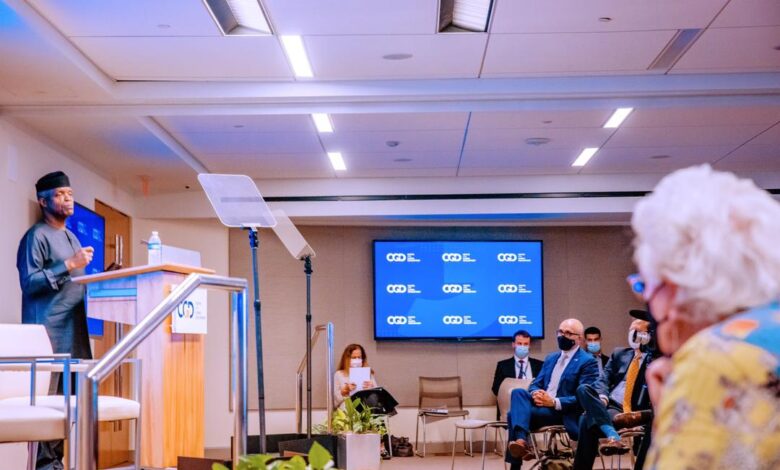Nigeria Seeks Debt Forgiveness To Finance Climate Change Projects
Nigerian VP Yemi Osinbajo proposed the introduction of a Debt-For-Climate Swaps deal into the climate finance mix during a recent event at @CGDev in the United States.

Nigeria’s Vice President, Yemi Osinbajo, is seeking a debt forgiveness deal in exchange for a commitment by indebted countries to use the outstanding payments for national climate action programmes, according to a statement from his senior media aide on Friday.
He was said to have explained the concept of the debt for climate swap deal during his speech on climate action, just energy transition, and climate investments at the Center for Global Development in Washington D.C.
“Typically, the creditor country or institution agrees to forgive part of a debt if the debtor country would pay the avoided debt service payment in a local currency into an escrow or any other transparent fund, and the funds must then be used for agreed climate projects in the debtor country,” Osinbajo said.
He explained that the deal would allow for the use of outstanding debt service payments for national climate action programmes.
According to him, the commitment to the debt for climate swap deal would “increase the fiscal space for climate-related investments and reduce the debt burden for participating developing countries”.
“For the creditor, the swap can be made to count as a component of their Nationally Determined Contributions (NDC),” he added.
Last year, the Nigerian government submitted an updated Nationally Determined Contribution (NDC) document, which included a commitment to the unconditional reduction of carbon emissions by 20 per cent below business-as-usual by 2030 and an increase of its conditional target to 47 per cent as against the 45 per cent stated in the 2015 target.
The Vice President’s remarks come days after Nigeria’s Minister of Finance, Zainab Ahmed, stated that delivering the country’s net-zero target by 2060 would require spending $1.9 trillion, including $410 billion above business-as-usual.
The minister spoke at the launch of an energy transition plan and pathway to net zero, which authorities say would result in the creation of up to 340,000 jobs by 2030 and 840,000 jobs by 2060. However, the ambitious plan will also require as much as $410 billion by 2060, an estimated $10 billion annually.
During the event in the United States capital, Osinbajo called on developed countries to support Africa to develop into a global supplier of carbon credits.
He was quoted to have said that “in addition to conventional capital flows both from public and private sources, it is also essential that Africa can participate more fully in the global carbon finance market”. He explained that the current carbon pricing systems, through carbon taxes, largely concentrate on high and middle-income countries.
The Vice President further stated that the “carbon markets can play a significant role in catalysing sustainable energy deployment by directing private capital into climate action, improving global energy security, providing diversified incentive structures, especially in developing countries, and providing an impetus for clean energy markets when the price economics looks less compelling – as is the case today.”
Support Our Journalism
There are millions of ordinary people affected by conflict in Africa whose stories are missing in the mainstream media. HumAngle is determined to tell those challenging and under-reported stories, hoping that the people impacted by these conflicts will find the safety and security they deserve.
To ensure that we continue to provide public service coverage, we have a small favour to ask you. We want you to be part of our journalistic endeavour by contributing a token to us.
Your donation will further promote a robust, free, and independent media.
Donate HereStay Closer To The Stories That Matter




